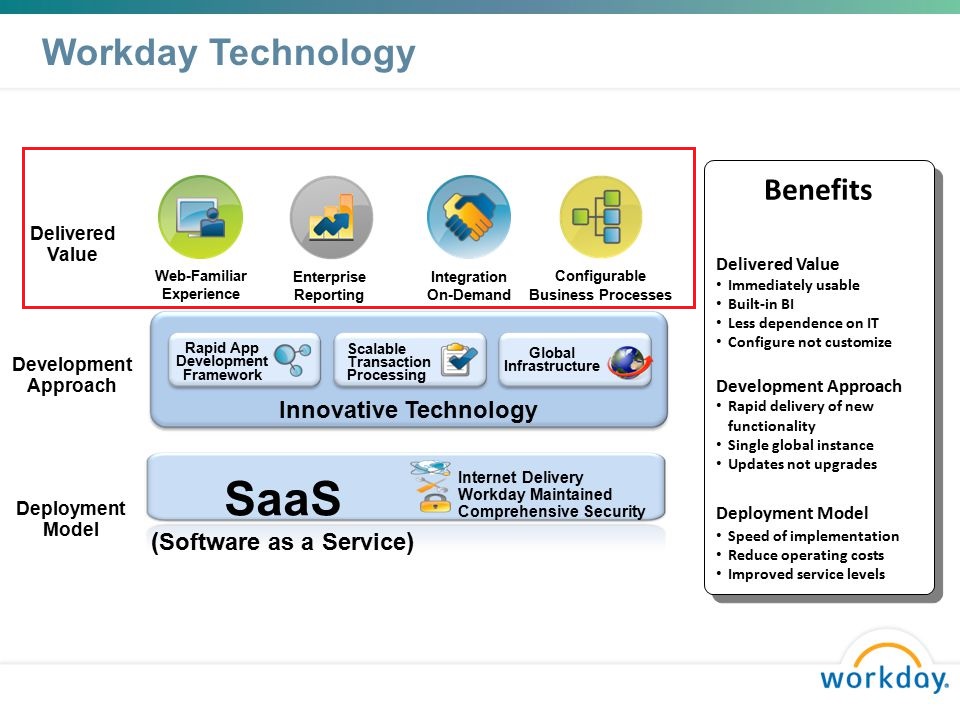If you are considering implementing Workday for your Human Capital Management (HCM) and / or Financial system needs, then you are likely aware that Workday is a Software as a Service (SaaS) application – centrally hosted and consumed over the Internet as a Service. The SaaS model will save your organization time and money on the maintenance tasks typically associated with an on-premise software installation. What it won’t do is absolve your IT staff from all Workday responsibilities, rather your team’s responsibilities will shift. Depending on your organizational structure, this role can stay solely within IT or it can be split between IT and the Business.
Let’s review the traditional on-premise software model and how your staff supported it.
| On-Premise Software Support Responsibilities |
|
|
|
|
|
|
|
|
|
|
With Workday, your IT Staff largely pivots away from the infrastructure maintenance to an application maintenance and integrations focus. Your staff would support Workday’s “Delivered Value” as defined in the Workday Technology Illustration below.

Let’s examine each “Delivered Value” item to determine how they translate into responsibilities for you and your staff.
Web Familiar Experience
Workday’s main user interface is through the Web Browser and will be how your users primarily interact with Workday (there is also an App).
Enabling your users to access Workday will be dependent on your staff and this can include the following application Maintenance and Support tasks.
- Adding and configuring New Users in Workday including Single Sign-On (SSO) set up
- Disabling Terminated Users
- Setting login and password expiration settings
- Monitoring New Releases and reviewing their corresponding System Release Notes
- Using Business Analysis to plan and manage projects for Enhancements and Additional Component Activation
- Keeping abreast of major functionality changes that will benefit your firm such as Workday Prism Analytics
- Configuring and Testing System Changes
- Troubleshooting User Issues and Managing the Issues to Resolution
- Administering your Workday environments (tenants) – Production and Staging to manage system refreshes and upgrades
Enterprise Reporting
Workday will become the Golden Source for your firm’s Human Resources and Financial data. Naturally, your users will want to take advantage of this and will want a comprehensive set of reports. Building these reports will require your staff to understand how Workday stores the data and how to extract the data using specific report types.
Furthermore, you will also need to think beyond Workday to consider how HR and Financials data in Workday can augment and complement the data in other areas of your firm. At many of our clients, the strategic vision in consolidating all of the firm’s data involves another tool, usually a Data Warehouse.
- Building Matrix Reports
- Building Advanced Reports
- Building Composite Reports
- Understanding the available set of pre-configured reports
- Planning how Workday data can be used throughout your firm
Integration On-Demand
Central to Workday’s functionality is the ability to communicate your data with both internal and external parties. Internally, you may want to have Workday interact with your internal CRM system such as Salesforce (typically for deal pipeline or other customer management). Externally, you will want to have Workday interact with your various Vendors for Procurement Punch-Outs, Banking Transactions, Benefits and Payroll. This data flow is done via Integrations / API Calls that were initially set up during the initial Workday deployment by the Workday Integrators.
Maintaining the Integrations, API Calls and related File Transfer Infrastructure will fall on your staff and the responsibilities include the following:
- Mapping out both internal applications and external vendors that will interact with Workday
- Monitoring Integration Runs and Troubleshooting Errors
- Collaborating with Vendor Contacts to determine the root cause and resolve
- Building custom Integrations in Workday Studio (if standard integrations do not meet requirements)
- Configuring and maintaining a File Transfer Server (if necessary) with secure file protocols such as SFTP, SSL, SSH, etc.
- Supporting file encryption with keys such as PGP keys
- Configuring the Firewall to white list Vendor IPs to allow the Vendor to connect to your File Transfer Server
Configurable Business Processes
Business Processes allow you to define and create your firm’s workflow in Workday. For example, to hire a new employee, each firm will have their own steps to initiate the hire process, enter data, run background checks, obtain approvals, etc. This process is taken from your firm and then re-created in Workday.
Your staff will need to develop their Business Process skills to support the business in the following manner.
- Investigating and Resolving Business Process Issues
- Creating and / or modifying Business Processes
- Tracking approvals given for Business Process changes through the Request Framework or other internal tool
- Reviewing and Analyzing the Business Process for risks due to Key Man Dependency, Separation of Duties, Improper Access Granted, etc.
Summary
Implementing Workday will require your IT staff to be fully committed and involved in the implementation from the beginning. This is critical for a successful implementation and a seamless operational support transition. Your IT staff will not be as focused on Physical Infrastructure but rather on Workday and the systems / components related to Workday. IT’s role is critical for segregation of responsibilities and allows your firm to successfully address audit points and regulatory concerns. This post is designed to guide and instruct you on the changes to come to you and your staff. FinServ has advised multiple clients on supporting their Workday implementation, augmenting their support staff and improving upon existing processes. FinServ is an experienced Workday integrator with the deep industry expertise needed to configure Workday optimally for your firm. For help in implementing or enhancing Workday, contact FinServ at info@finservconsulting.com or give us a call at (646) 603-3799.
About FinServ Consulting
FinServ Consulting is an independent experienced provider of business consulting, systems development, and integration services to alternative asset managers, global banks and their service providers. Founded in 2005, FinServ delivers customized world-class business and IT consulting services for the front, middle and back office, providing managers with optimal and first-class operating environments to support all investment styles and future asset growth. The FinServ team brings a wealth of experience from working with the largest and most complex asset management firms and global banks in the world.

